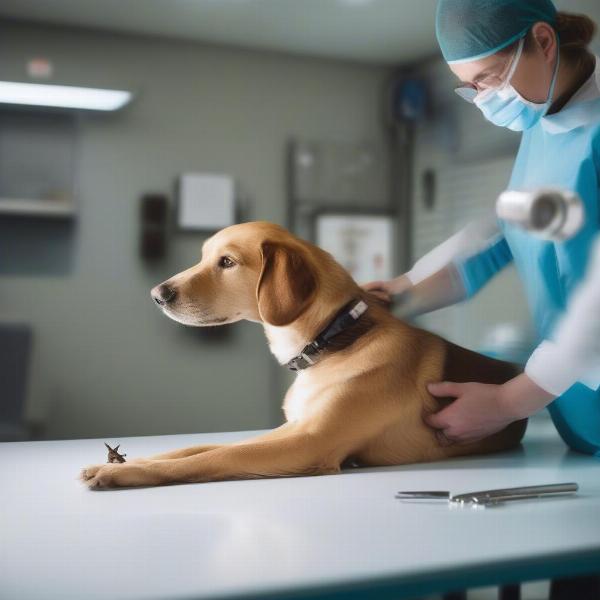Slug pellets are a common gardening tool, but many contain metaldehyde, a highly toxic substance for dogs. If ingested, even small amounts can cause severe symptoms and even death. So how do you protect your precious plants and your furry friend? This article dives deep into the world of dog-friendly slug pellets, exploring safe alternatives, preventative measures, and what to do in case of accidental ingestion.
Understanding the Danger of Traditional Slug Pellets
Traditional slug pellets often contain metaldehyde, which disrupts a dog’s nervous system, leading to tremors, seizures, and breathing difficulties. Symptoms can appear quickly, requiring immediate veterinary attention. Even if your dog doesn’t show immediate signs, metaldehyde poisoning can cause long-term liver damage. The risk is especially high for curious puppies or dogs prone to scavenging.
Safe Alternatives to Metaldehyde Slug Pellets
Fortunately, there are several dog-friendly slug control options available:
- Iron phosphate pellets: These pellets are considered safe for pets and wildlife, disrupting the slugs’ digestive system rather than their nervous system.
- Nematodes: These microscopic worms prey on slugs and are a natural, effective control method. They are harmless to pets, plants, and other beneficial insects.
- Beer traps: Slugs are attracted to beer, and a shallow dish of beer buried in the garden can lure them to a watery end. Ensure the trap is deep enough that your dog can’t easily access it.
- Copper tape: Copper creates a small electric shock that deters slugs. Place tape around plant pots or raised beds to prevent slug access.
Preventative Measures to Protect Your Dog
While using dog-friendly slug pellets is essential, preventative measures offer an extra layer of protection:
- Supervise your dog in the garden: The best way to prevent ingestion is to keep a close watch on your dog while they are outdoors.
- Train your dog to leave garden beds alone: Consistent training can teach your dog to avoid areas where slug pellets have been applied.
- Store slug pellets securely: Keep all garden chemicals, including dog-friendly pellets, out of reach of your dog in a locked shed or cabinet.
- Clean up any spilled pellets immediately: Even dog-friendly pellets can cause digestive upset if ingested in large quantities.
What to Do if Your Dog Ingests Slug Pellets
If you suspect your dog has ingested slug pellets, even dog-friendly ones, contact your veterinarian immediately. Time is of the essence, and prompt treatment can significantly improve the outcome. If possible, take the pellet packaging with you to the vet to help them identify the ingredients and determine the best course of action.
 Veterinarian Examining Dog
Veterinarian Examining Dog
Keeping Your Garden Thriving and Your Dog Safe
Maintaining a beautiful garden shouldn’t come at the expense of your dog’s health. By choosing dog-friendly slug pellets and implementing preventative measures, you can create a safe and enjoyable outdoor space for both your plants and your furry companion.
FAQ
- Are all slug pellets bad for dogs? No, but many contain metaldehyde which is highly toxic. Always opt for dog-friendly alternatives like iron phosphate.
- What are the symptoms of metaldehyde poisoning in dogs? Symptoms include tremors, seizures, drooling, vomiting, and difficulty breathing.
- Can nematodes harm my dog? No, nematodes are a safe and natural way to control slugs and are harmless to pets.
- What should I do if my dog eats a slug? While slugs themselves aren’t usually toxic, they can carry lungworm parasites. Consult your vet for preventative treatment.
- How often should I apply dog-friendly slug pellets? Follow the instructions on the product packaging for the best results.
- Are there any plants that naturally repel slugs? Yes, certain plants like rosemary, lavender, and mint can help deter slugs.
- Can coffee grounds be used as a dog-friendly slug repellent? While often suggested, their effectiveness is debatable and they can alter soil pH.
Related Articles on ILM Dog
doff slug and snail killer safe for dogs
ILM Dog, your go-to source for expert advice on dog care, offers a wealth of information on everything from breed selection to health, training, nutrition, and grooming. We are dedicated to providing pet owners worldwide with practical, reliable advice to ensure their canine companions live long, healthy, and happy lives. Whether you’re a seasoned dog owner or just starting your journey, ILM Dog has the resources you need. Contact us today at [email protected] or +44 20-3965-8624.